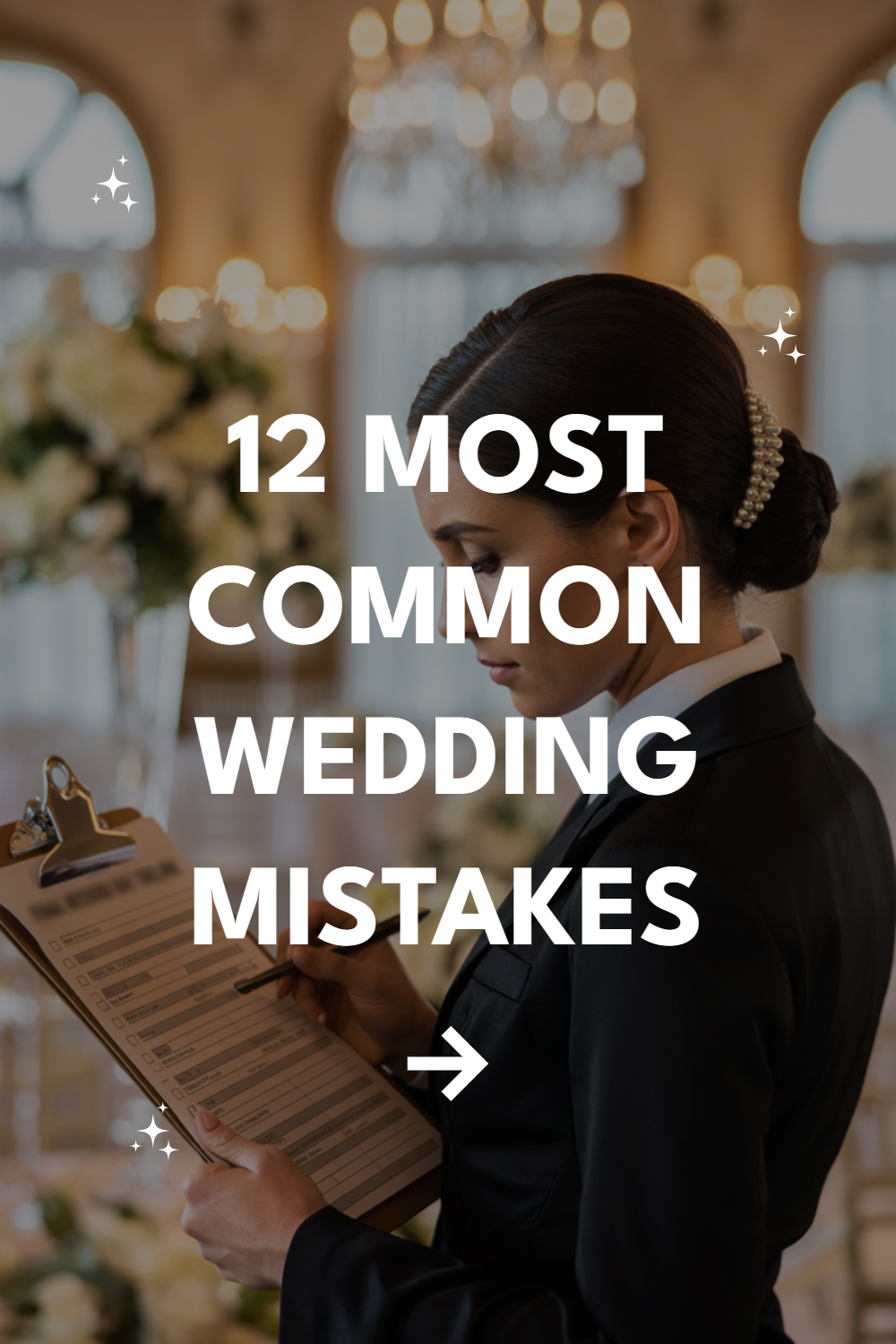After planning dozens of weddings and witnessing countless “learning experiences,” I’ve noticed that couples often create their own stress without realizing it. These self-inflicted wounds are entirely preventable, yet they happen with surprising frequency.
Here are the most common ways couples accidentally torpedo their own big day.
1. Inviting Everyone You’ve Ever Met
That college roommate you haven’t spoken to in eight years? Your mom’s hairdresser’s daughter? The temptation to invite everyone runs strong, especially when you’re caught up in wedding excitement.
Large guest lists spiral out of control faster than you can say “plus-one.” Every additional guest means more catering costs, larger venue requirements, and exponentially more logistics to manage.
You’ll find yourself spending your reception making small talk with people you barely know instead of celebrating with those who matter most.
2. Booking Vendors Without Reading Reviews
Your cousin’s friend’s sister is a photographer, and she’s giving you a “great deal.” Red flags should be waving, but that discount looks so tempting on your spreadsheet.
Skipping proper vendor research is like playing Russian roulette with your wedding day. Professional vendors have backup equipment, insurance, and experience handling wedding-day chaos.
Amateur vendors, no matter how talented, often lack the resources to recover when things go wrong.
3. Leaving Everything Until the Last Minute
Procrastination feels manageable when your wedding is “still months away.” Then suddenly it’s six weeks out, and you haven’t ordered flowers, confirmed transportation, or finalized your menu.
Popular vendors book up early, especially during peak wedding season. Waiting too long leaves you scrambling for whoever’s available, often at premium prices. Rush orders frequently come with additional fees and limited options.
4. Ignoring Your Budget Reality
Wedding math is cruel mathematics. That $30,000 budget somehow becomes $45,000 when you start adding up all the “small” extras that “don’t cost that much.”
Financial stress during wedding planning can strain relationships and create lasting resentment. Couples who overspend often start their marriage buried in debt, which statistically increases divorce rates.
Setting a realistic budget and sticking to it protects both your wedding day and your future together.
5. Micromanaging Every Detail
Pinterest perfection is a dangerous drug. You spend hours obsessing over napkin folds and centerpiece heights, convinced that every detail must be exactly right.
Perfectionism creates unnecessary stress and often leads to disappointment when reality doesn’t match your Pinterest board. Guests rarely notice the tiny details you’ve agonized over. They remember the atmosphere, the celebration, and how happy you looked.
6. Skipping the Rehearsal
Rehearsals feel optional when everyone involved is an adult who can “figure it out.” After all, how hard can it be to walk down an aisle?
Wedding ceremonies involve precise timing, multiple moving parts, and people who are nervous. Without practice, processionals become chaotic, readers stumble over unfamiliar passages, and the whole ceremony feels disjointed.
A smooth rehearsal creates confidence and reduces anxiety for everyone involved.
7. Forgetting to Eat
Wedding days are long, adrenaline-filled marathons. Between getting ready, photos, and pre-ceremony nerves, meals often get skipped or forgotten entirely.
Low blood sugar and dehydration turn minor issues into major meltdowns. Hungry, tired people make poor decisions and have shorter tempers. Fainting during your ceremony isn’t romantic—it’s completely avoidable with proper meal planning.
8. Overloading Your Wedding Party
Your wedding party should include people you love, not everyone you feel obligated to include. Large wedding parties become expensive, complicated, and difficult to coordinate.
Each additional person means more opinions, more schedules to coordinate, and more potential for drama. Smaller wedding parties are easier to manage and often more meaningful. Quality trumps quantity when it comes to the people standing beside you.
9. Ignoring Weather Contingencies
Outdoor weddings are magical when the weather cooperates. Unfortunately, weather doesn’t consult your wedding timeline before deciding to rain, snow, or unleash hurricane-force winds.
Hope for the best but plan for the worst. Backup plans aren’t pessimistic—they’re practical. Tents, indoor alternatives, and weather-appropriate timeline adjustments can save your day when Mother Nature doesn’t cooperate.
10. Underestimating Timeline Requirements
Weddings always take longer than expected. Hair and makeup run over, transportation hits traffic, and photos require more time than anticipated.
Rushed schedules create stress and force you to skip important moments. Build buffer time into every part of your day. Starting hair and makeup an hour early is infinitely better than walking down the aisle with half-finished makeup because you ran out of time.
11. Forgetting Why You’re Getting Married
Wedding planning can become so consuming that you lose sight of the actual purpose: celebrating your commitment to each other. The day becomes about executing a perfect event rather than beginning your marriage.
Couples who focus solely on wedding logistics often feel empty after the big day. The months of planning culminate in a single day, but the marriage is what matters long-term. Regular check-ins about your relationship and future together keep priorities straight.
Your Wedding Day Survival Guide
| Timeline Buffer | Recommended Extra Time |
|---|---|
| Hair & Makeup | 60-90 minutes |
| Photography | 30 minutes per session |
| Transportation | 15-30 minutes |
| Ceremony Start | 15 minutes |
| Reception Transitions | 30 minutes |
The Real Secret to Wedding Success
Perfect weddings don’t exist, but joyful ones absolutely do. The couples who have the best wedding experiences are those who stay flexible, focus on what matters, and remember that their guests want to celebrate with them.
Your wedding day will have imperfections—flowers might wilt, someone might trip, or dinner might run late. These moments become funny stories later, not relationship-ending disasters.
Embrace the chaos, laugh at the mishaps, and focus on the fact that you’re marrying your favorite person.
The best wedding advice I can give? Plan thoroughly, then let go of control on the actual day. Your job isn’t to manage every detail—it’s to show up, say your vows, and celebrate the beginning of your marriage.


